Erstellt am: 25. 2. 2017 - 06:00 Uhr
Children Under the Radar
Nearly 50 million children and young people around the world have fled from their home countries, driven out by war, poverty, or persecution. That’s more than the entire population of Spain. About half of them are from Syria and Afghanistan. Many of them set out alone from their homes seeking safety and survival, but whether they travel alone or with their families, if they travel to Europe, the journey will almost certainly be dangerous, traumatic, and frightening.
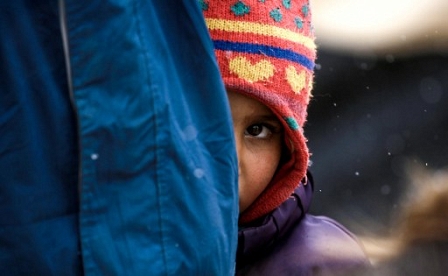
DELIL SOULEIMAN / AFP
FM4 Reality Check
Hear the Saturday Reality Check Special "Children Under the Radar" in the FM4 Player or subscribe to the podcast and get the whole programme after the show
Recently, mayors from Jordan, Lebanon, Turkey, Italy, Austria, and Greece met in Vienna for the “NOW” International Mayors’ Conference. The idea is to bring together local decision makers, representatives from NGOs and relief organizations, as well as trauma and education experts, to work on ways to ease the plight of child refugees. They share their experiences, workshop ideas, and make connections. The conference was in the ÖBB Werkstättenhalle, fittingly surrounded by trains – which may have carried many refugees on their journeys.
Austrian artist Andre Heller is one of the people behind the social enterprise Act.Now which organised the conference. His opening speech made an impassioned appeal to Europeans not to give in to the rising tide of xenophobia, and to recognise our humanitarian obligation towards these children. He said, “Children are killed and their organs are sold. Children are forced into prostitution… When they arrive in certain European countries they feel that they are not welcome. They’re left alone, without education, without inspiration that encourages them.”
So, what is being done to ensure a brighter future for these children? The conference heard how, in Jordan and Lebanon, thousands more classrooms have been built, despite limited funds, and we heard about the success of psychological support for children with post-traumatic stress disorder, or PTSD.
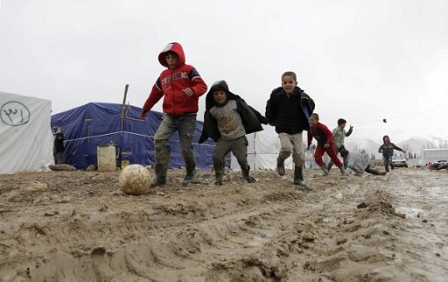
JOSEPH EID / AFP
Catherine Barnett of UNICEF in the Middle East and
North Africa coordinates an initiative called No Lost Generation, which aims to ensure that all children affected by the Syria and Iraq crisis are safe, and in school. She told me there is a whole host of reasons why children may suffer even after they’ve escaped from war zones or other traumatic situations.
They may have difficulty proving their age or level of education, making it hard for them to fit into a new education system, or their families may be living in desperate poverty and reliant on their children to work. All this has a severe impact on their ability to learn, develop, make friends, and live as normal a life as possible. In the Middle East, a shift in policy means Syrian children can now go to school in the countries they have fled to, which is crucial for ensuring social cohesion and integration.
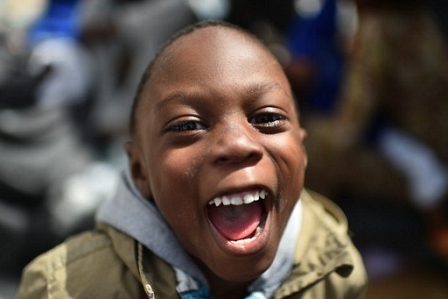
GABRIEL BOUYS / AFP
I also spoke to Nihad Bunar, who fled from Bosnia during the war in the 1990s, is now a professor of child and youth studies at Stockholm University. His research focuses on migration and education, especially the inclusion of newly arrived refugee children in Swedish schools. In 2015 a record number of 71,000 child refugees and migrants arrived in Sweden. Professor Bunar is in favour of ‘support based inclusion’, which means that refugee children are given the help they need to learn Swedish, and are then included as soon as possible in normal classes with other Swedish children. He told me that having the support and encouragement they need at school helps them more than anything to feel safe again, and to start leading a more “normal” life.
One person who made a lasting impression on me was Farah Abdi, a 21-year-old Somali transgender refugee and an award winning blogger, who is now applying for asylum in Berlin. Farah was born in Somalia, but her family fled to Kenya because of the civil war. Growing up, Farah realised she was different from most other children and came to realise that her gender identity would never be accepted.
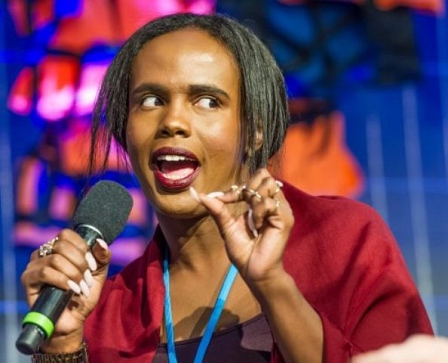
Wolfgang Simlinger / Act.Now
Afraid of persecution and tired of living with stigma, at the age of 16 Farah fled to Europe, and arrived in Malta after travelling by sea from Libya in 2012. She didn’t want to say much about that journey, apart from the fact that it was terrifying and traumatic. She was still angry about being detained when she first arrived in Malta. She says that treating refugee children with respect and compassion is crucial to making sure they become integrated, functioning members of their new society.
UNICEF’s Catherine Barnett agrees that politicians need to promote tolerance. “We need to have the preconditions in place to ensure that children can use their natural resilience and ability to recover”, she says. She adds that “a key issue is that children must never be detained – as this causes further distress and alienation”.
The vibe at the end of the two day conference was very positive, and we heard how change can be achieved with dedication and humanitarianism. Experts working in the Middle East and in Europe made connections that will help them move forward and will continue working together in the future. I did wonder how much such an event could achieve in two days, but its heart is definitely in the right place. Mayors and local politicians, after all, are the people who are closest to what’s happening in their cities and towns, and they are in a position to bring about change at a local level. Of course, there is no single solution – each child and each family is different – but we have to remember to listen to them.
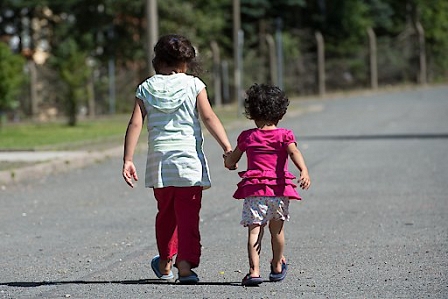
Sebastian Kahnert/dpa-Zentralbild



